
Quality grains for food – the potential of non-commercialized Norwegian varietal material
A diversity of plant varieties is needed to ensure food security in a changing climate. In plant breeding, new genetic variation is created through crossbreeding, pure line selection and varietal testing prior to commercial release.
Norwegian cereal breeding aims to develop varieties with high yields, strong straw and resistance to fungal diseases and weather extremes. Grain should not germinate within the grain head, the heads should not break off, and the variety should be resistant to lodging. Weather and fungal resistance, and straw strength are important traits for both conventional and organic cereal production. Other traits, however, may be weighted differently by the different systems, e.g., due to lower fertilizer rates and the absence of plant growth regulators and pesticides in organic production.
Plant breeding in Norway is under pressure. Breeding programmes are not adapted to different regions or production methods. The market is limited, and the competition to commercialize new varieties is tough. Unsuccessful breeding lines may nevertheless have valuable traits and be suitable for use in low-input systems.
A main objective of this project is to identify lines with traits that could be specifically important for organic or extensive cereal production for use in craft bakeries, and to test the correlation between traits and environmental conditions. The project will focus on spring wheat cultivation in central Norway. We will systemize the data after testing under various site and climate conditions, and develop a database with information about agronomic characteristics and baking quality of varieties and breeding lines. The project aims to increase our knowledge about the genetic resources of cereals. We wish to contribute to increasing varietal diversity to meet the challenge of climate change, and to provide the domestic market with varieties that are suitable for organic farming and craft baking.
The project is a joint effort between NORSØK, NIBIO and Graminor, with Anne-Kristin Løes, Randi B. Frøseth and Jon Arne Dieseth as the respective contacts. We cooperate with the research project EXPAND, and use Graminor’s experimental plots of 20 breeding lines of spring wheat in organic production.

